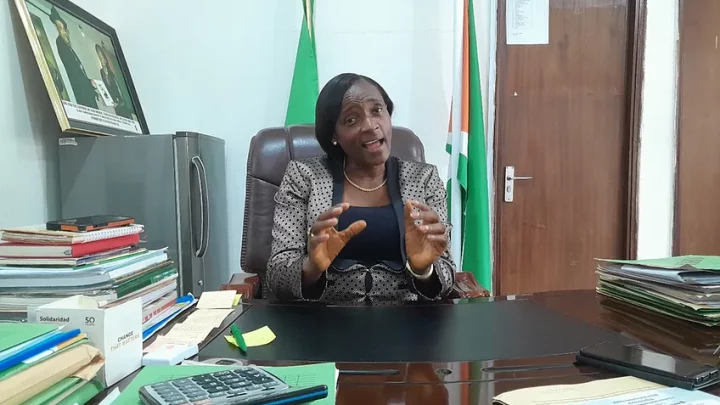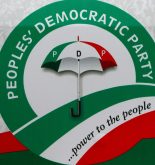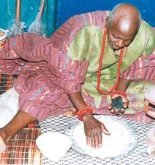Offiong Offor, Akwa Ibom State’s immediate past agriculture commissioner, is unpretentious, friendly, and highly professional. In this interview with our MANAGING EDITOR, IBANGA ISINE, she discusses her first meeting with former Governor Udom Emmanuel, her contribution to the state’s agricultural revolution, and a glimpse into her personal life. The inspiring story of this human dynamo is one you definitely don’t want to miss.
Note: This interview was done before the end of the Udom Emanuel administration.
Can you tell us a little about yourself?
My name is Offiong Offor. I studied Agricultural Economics. I earned a Ph.D. from the University of Nigeria, Nsukka; a Master’s degree from Michael Okpara University of Agriculture, Umudike, and a Bachelor of Science degree from the University of Calabar, Cross River State.
Tell us about the government’s agricultural policy?
Government’s policy thrust in agriculture has been to ensure that the state attains food sufficiency. In the process of doing that, several other goals have been achieved such as wealth creation, job creation and an atmosphere for specialisation. As a government, we have supported people across different value chains and ensured that they work towards the objective of making the state food sufficient.
What strategies have been put in place to ensure the state is food sufficient?
To have more food in the state, we made sure that the cost of production is significantly reduced and I can tell you how we did that. One of the ways we have achieved that is by highly subsidising the machines they use for land preparation. We have also supported local farmers across the different agricultural value chain with farming inputs and financing.
Once land preparation is taken care of and they get not only the required inputs but also taught how to apply them in addition to funding, the cost of production goes down. In the long run, profitability will increase, wealth will be created for farmers, and employment opportunities will expand beyond the available family labour.
When we came in, we found that many farmers were holding onto some traditional beliefs that were handed down to them by their grandparents who were farmers. They can only plant certain crops in a particular method and they keep repeating this method time and time again. What we did was educate them to change that entrenched practice. We introduced them to improved varieties and planting techniques. For instance, our people used to cultivate these very tall oil palm trees but the trend has changed now. Over time, research has shown that the hybrid palms which are shorter produce more oil. So, our farmers have been introduced to these varieties. It’s not only palms, we have introduced them to different crops such as cassava, rice, cocoa, coconut, among others.
When you plant the hybrid species, the output will be better. For instance, when people continue to recycle a particular cassava cutting over the years, the yield reduces. Now we have introduced our farmers to faster growing varieties, which have been tested in our seed multiplication centres. In one of the trainings we organised, some of them had expressed surprise that the angle at which we cut the cassava stems was different. As a root crop, if your cutting is not done in the right way, it will affect the development of the tubers. Knowledge is evolving every day and our extension agents are telling them, ‘look, the way you used to do it is not right. Time has changed and you’ll have to move with time in order to get more out of what you plant.’
Some of them have an impression like, ‘we’ve known this process. Our grandfathers were farmers. We know how to do it.’ While it is difficult to change that kind of mindset, we’re doing our best to ensure they adopt the best practice. As a result of what we are doing, donor agencies are coming in to partner with the state government to see how to change these farmers in different value chains that we have comparative advantage, like aqua-culture, poultry, cassava and so on.
Before now, people thought it was impossible to plant cucumbers, tomatoes and onions in the state but that has changed. How did this happen and what are the success stories?
Tomatoes, cucumber, onions, pepper and many others were crops we used to buy from the North. When we came in, the government decided that we should try to grow them and see how they would work. The greenhouse along the Airport Road provided an environment that couldn’t naturally be present. We didn’t even know that outside the greenhouse we could cultivate tomatoes and they thrive.
We had to do a test run and that is because whatever we want to do, we do a pilot plot and scale it. The greenhouse was constructed and the crops were experimented and we saw that they were doing very well. After that, farmers were trained on how to grow them. Our pepper has a good flavor and our tomato is one of the best. We also did a test on cucumbers. What I found out and what many people have confirmed is that the variety of the cucumber seeds we gave to our farmers from the greenhouse are very soft and sweeter than the regular cucumbers.
The game changer was that we planted improved varieties under certain conditions and when we found that they were doing well, we transferred the knowledge to farmers in the state. Look at a crop like an onion. We can grow it here and it is doing very well. We now grow red and green peppers in the state. This was not done before now, but someone thought that it is achievable and today we now produce many of those vegetables we used to buy from the north. We have now bridged the supply gap from the north. Our vegetables are of the highest quality, and that is why you see people scrambling for them.
People never imagined that onion, which is a dry season vegetable, can be cultivated on our soil. It is a plus to the government. When we talk about food sufficiency, we go beyond the food being enough to ensure there are varieties so our people can eat healthy. What we have done is not all about experimenting with the crops. We are also interested in the health of the people. We want people to eat healthy with the hope of increasing their life spans. It has been a success story.
People are concerned about using genetically modified crops. Do you have a mechanism to ensure that GMO crops are not used in the state?
You would be surprised to know that local farmers do not just accept crops introduced to them. They would reach out to us through the extension agents to inform us that someone brought a particular product to them and would ask if they should use it. If any such thing comes up, we would advise them through the extension agents. We are also able to handle that from the standpoint of the law, working in line with the provisions of laws of the Federal Government of Nigeria.
How does the government relate with the farmers? Is it through the extension agents, individual farmers or the clusters?
We work both with the clusters and individual farmers. The extension agents identify with both groups. They register with us in the ministry. We have a database of farmers in the state.
How many clusters or cooperatives do you have?
We are encouraging farmers to embrace clusters. The last time we checked, there were over 100 clusters across the state and they are also registered with the Ministry of Rural Development. The idea of farmers forming cooperatives has not been our culture but it is thriving well in the North. Here, we’re encouraging people to embrace it. We were involved in FADAMA 1-3, where farmers were related within groups. The programme helped us to form more clusters and even maintain the clusters when it ended.
The state has many food crops and trees that are on the verge of extinction, making the issues of biodiversity and conservation crucial to food security. Does the government have a plan to stop these dangerous trends?
We have seriously been affected by climate change, erosion and gas flaring. That is why we have been training our farmers on measures like liming the soil to reduce the level of acidity and terracing where there is erosion. I am aware that certain species of crops like cocoyam are gradually going into extinction. In fact recently, the issue came up and we deliberated on how to get back some of these crops. It was agreed that to get these crops back, we are going to embark on research. Remember we used to have a local bean known as ‘nsama.’ It is no longer popular, especially because our diets have changed over time. Our young people tend to eat more of Western foods due to modernisation. They now see diet as a class thing and ignore local foods like ‘nsama,’which is very rich in nutrients. Most health issues could be traced to diet and we know that eating local foods like cocoyam and others could be of help. We are staging a comeback for crops that are gradually going into extinction. If we have a good number of farmers cultivating cocoyam or ‘nsama,’ we will gradually get them back.
Now, let’s talk a little about politics. How did you blend into politics so easily as an academic?
It was tough initially because I was not too familiar with the terrain. In terms of work, I have done a lot of NGO work that’s related to the grassroots. So, working in the ministry of agriculture wasn’t too much an issue. How did I overcome the political challenge? I would say that they are the same grassroots people but in this case, you’re meeting them under a different umbrella. There were many ways to learn – reading, observation and being taught by someone. There are some things you have to experience. So, whenever I was at meetings, I always stayed very quiet and observant. On the whole, it looks like I have been in politics for a long time. Every day, new pages and chapters unfold. You get to interact with people to understand the dynamics. I cannot say that I have the complete picture. But I am learning certain aspects that were opened to me. During my NGO work, we used to enter communities. We have what we call ‘community entry,’ where we see the village head to hint him about our mission in his domain. The same thing is applicable to politics but this time, it comes under varying ways and interests. Anytime you do something that is people-oriented, people will accept it and that is typical in my place of origin. When you engage in activities geared toward improving the livelihood of the people, you talk less to gain acceptance. When you ask them to do something, they give you their loyalty because they know that you have their interest at heart and that you’re not pretending. They would have seen things on ground you do genuinely to help them.
In my position, I try to make farmers feel that they are the engine room of society. Since food is the most basic need of man, we all must understand that without farmers we would be in trouble. And I am not saying that to flatter them. I say that to let them have a sense of belonging. Outside Africa, farming is viewed as one of the core determinants of the economy. Now we are struggling to leave subsistence farming and the associated perceptions. So we try to boost their morale.
What is the percentage of the budget share for Agriculture?
In the last budget, I think agriculture got the second largest share. In the just presented budget I need to confirm the percentage and get the exact figures before I make it public.
What has been the most challenging thing you have faced since you moved from academics to politics?
It was politicians at the grassroots accepting me. You know I came from the academics and some of them felt, oh, she is a university lecturer. What does she know about politics? So I had to deal with that a lot.
So, they tell you that?
Yeah. Sometimes in clear terms or by their actions. It is for you to know or show it is not what you do that defines you. First of all, you’re an individual and people should cut you some slack. They should give you the benefit of doubt. But they felt that I was a greenhorn. ‘She doesn’t really know the terrain,’ some people really say that.
I have learnt something through exposure in academia. The academic world offers you a wide platform to be exposed to so many things. I have attended schools in different parts of the country; Igboland, Yorubaland, and in Cross River. I have seen people in varying settings and I have done a lot of NGO work. The principles you use in relating with people in those settings are the same you apply in politics. It’s just a thin line separating them. I am not given to bragging. When I attend a meeting, someone will get up to address the audience and there is a lot of cheering. I ask myself, ‘why are people cheering for him or her?’
Beyond the cheering, when the person leaves the vicinity, many people will troop after him. I found out that if you possess goodwill, you will have followership. When you show people that you care about them, when you talk to them, they’ll listen to you. If you have the goodwill of the people you will go places. I think that is something that really sells politicians. I have learnt little by little but it wasn’t very familiar terrain.
Now, how do I cope with the elites who on one hand would say this lady came from the university, but there is something she wants to reach out to us about? Academics are not scared by things or people. We’re always confident. I don’t know about any other person but I can talk about myself. My father used to teach me, ‘Don’t let anybody define you. As a lady in Africa, you have to fight yourself to the top. Because the things fighting you are more than those fighting the men. So, don’t let anybody make you feel that your gender is a disadvantage.’
So when I enter the circle of the elites, I talk less and listen a lot. In the quietness, I learn a lot from what people are saying and their interactions with other people. There is no basis for competition. People ask me, ‘Why do you wear your hair in a particular way,’ and I say this is the way I am comfortable with. It doesn’t matter what any other person is doing. It is still a learning process, from the smallest to the biggest. Every day, I learn something. Now I can relate with everyone from the security personnel to the cleaner and so on.
Is there anything you want to say that my questions have not covered, I mean something that is so dear to your heart?
I like to say that nobody should ever let the circumstance of birth or society define them. Determine where you want to go in life and go after it. When I look back at my life, if I didn’t make decisions at certain points in my life, I would have had a hard time along the line. For instance, people were telling me, ‘you are too academic.’ As at the time I had my PhD, I wasn’t married. It took a lot of courage to go back to school as a single person. When I look back, I give God the glory that I made that decision. My circumstance taught me that people will always have an opinion about something but it is the individual that determines where the opinion plays in their life. It was one of the toughest times in my life. I was the only single Ph.D. student in my department.
How did you feel being the only single student in a class made up of married men and women?
I know between me and God the experience I passed through in that class. Schooling in Igboland, you know how they treasure marriage. You come to school, they don’t see you with a ring or carrying children to school. They will treat you differently. Stigmatisation goes beyond disease to academics. I had to fight that. The day I got my PhD, it was a different scenario. As I collected my certificate, I was looking at it with joy and a voice told me, ‘this is your worth.’
Who was this great guy that finally hooked you?
It was someone I have always known but you know the familiarity that existed made me feel he wasn’t serious. At a point before completing my programme, he kept saying, ‘you need to consider my proposal for marriage.’ He kept encouraging me to go to school in pursuit of another degree. I wanted to prove that you don’t need to put your life on hold until all the things fall in place. You must go on a path. Success is a journey and everything will meet you on your path.
When the guy still insisted, what did you do?
When he still insisted I knew he was serious. He didn’t have a PhD and was not intimidated by my status. I am not very expressive emotionally. I internalise my feelings but he is a very expressive person and he tried to bring me out of my shell. I finally answered yes when he insisted on spending the rest of his life with me. The rest is history. I am very happy that God gave me a person who will not feel intimidated at my level of my attainment. That was important to me because I found out that so many people I met felt that if you are too enlightened or exposed, it’s going to be an issue for you. If you have a dream, don’t put it on hold because you feel that you must attain a certain status prescribed by the society. I want to advise the womenfolk, follow your dreams. Trust God and keep going. Success is a journey. While on course, God will help you. You will even exceed your expectations.
How did your appointment as a commissioner come?
I was appointed commissioner last March. The name was first forwarded to the House of Assembly for screening. I was teaching some master’s students in Akwa Ibom State University. When I finished, I found that my brother was calling. I picked and he said, ‘where are you?’ I responded, ‘school.’ He said, ‘come to Uyo.’ I asked, ‘what is happening?’ He said, ‘you have been announced on radio as commissioner nominee.’ I said ‘how?’ So many calls kept coming and people were asking, ‘where are you?’ How I drove from school to Uyo was a miracle. So many thoughts ran through my mind. ‘How did I get there?’ It was a big surprise.
How was your first meeting with Governor Udom Emmanuel?
I was tense. When I entered his office for an interview, he sat back and looked at me. I was the smallest in the frame. He said, ‘tell me about yourself, do you have a PhD?’ When he exhausted the questions, he said, ‘okay, we are done.’ The seriousness on his face added to my tension.




